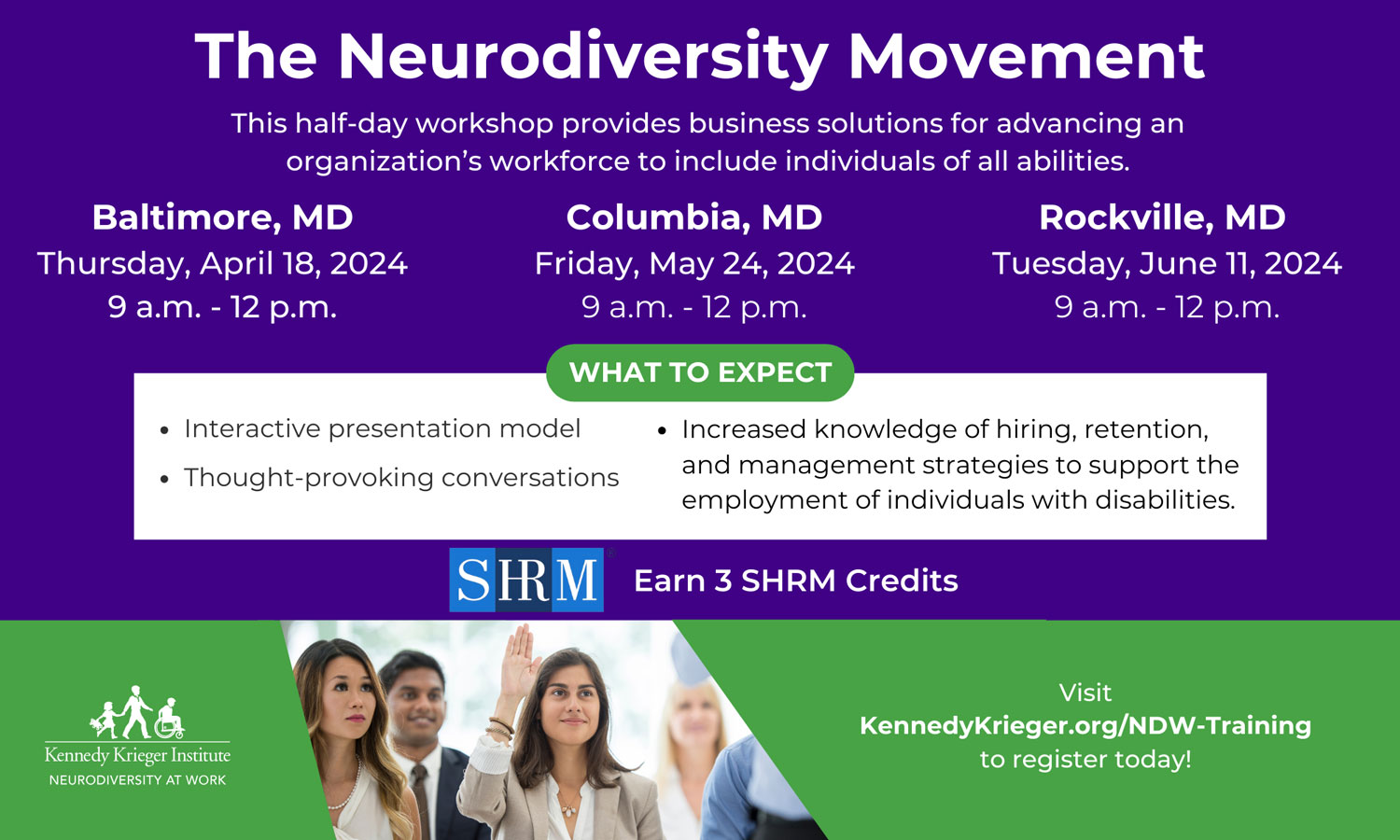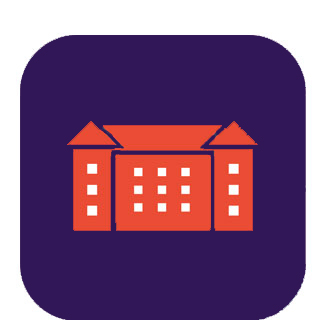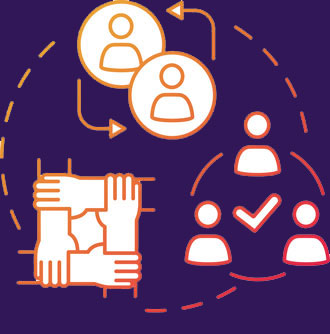Kennedy Krieger offers workforce training and development through customized, in-person Workforce Awareness and Inclusion training for Institute employees and local businesses.
We provide support to each individual and business for successful, sustainable, and integrated employment for all abilities.
Training Opportunities
In person Trainings and Virtual Trainings are offered
- Virtual Trainings: $500 per hour
- Onsite Trainings: $500 per hour
- Package pricing is also available
Please reach out via the Training and Education Inquiry Form for more information.
A 14% indirect charge is applied to all training services.
The Neurodiversity Movement Training

This presentation provides an overview of neurodiversity, building an inclusive workforce, breaking down barriers to employment, and understanding the business case for hiring individuals of all abilities. This training is interactive and thought provoking, designed to provide strategies and education for employers to be better prepared to recruit, retain, and manage individuals with disabilities as part of the workforce.
Currently 80% of individuals who identify as having a disability are currently not part of the workforce, and this training provides business solutions for advancing an organization's workforce to include individuals of all abilities.
This presentation will cover the following topics and more:
- Barriers to employment for individuals with disabilities
- Best practices for recruitment, management and retention strategies
- Disability education
- Workplace accommodations
- Self disclosure
- What is an adult service provider
- Communication, interview and onboarding strategies
- Employer and provider collaboration for recruitment
- First-hand experiences from businesses and the individuals they employ
- Overview of Universal Design
Refreshments will be provided at the training.
Individuals participating in these half day workshops are eligible to earn 3 SHRM continuing education credits.
The training fee covers all registration and processing fees. To register for a training, click on your preferred date and location at one of the links below:
Columbia
Kennedy Krieger Institute
9730 Patuxent Woods Dr., Columbia, MD 21046
Date: May 24, 2024
Time: 9 a.m. - 12 p.m.
Training Cost: $449.00
Rockville
Main Street Apartments
50 Monroe Pl, Rockville, MD 20850
Date: June 11, 2024
Time: 9 a.m. - 12 p.m.
Training Cost: $449.00
Inclusive Workplace
The Neurodiversity Movement Part 1 Building an Inclusive Workforce, Getting Started
Course Description
This presentation provides an overview of neurodiversity, building an inclusive workforce, breaking down barriers to employment, and understanding the business case for hiring individuals of all abilities.
The Neurodiversity Movement Part 2 Fostering and Sustaining Provider and Business Relationships
Course Description
As businesses continue to hire individuals with a range of abilities, business leaders need support and guidance from experts in the field of adult services. This presentation will focus on, what is an adult service provider, how to foster and sustain relationships between the business’s community and adult service providers, and first-hand experiences from businesses and the individuals they employee.
 Strategic Approaches Universal Design
Strategic Approaches Universal Design
Course Description
This presentation provides an overview of universal design, and how businesses can apply universal design philosophies to building a more inclusive workforce.
 Strategic Approaches Overview of Disabilities
Strategic Approaches Overview of Disabilities
Course Description
This presentation will provide a brief overview of disabilities, disability services, and strategies to support an inclusive workforce.
 Strategic Approaches Interview and Workplace Modifications
Strategic Approaches Interview and Workplace Modifications
Course Description
This presentation will provide concrete strategies that businesses can implement to hire and retain individuals with disabilities. These strategies will break down the barriers that impact individuals with disabilities from obtaining meaningful employment.
 Strategic Approaches Adjusting to a Remote Workplace
Strategic Approaches Adjusting to a Remote Workplace
Course Description
This presentation will focus on developing, designing, and maintaining a remote workplace post pandemic. We will look at lessons learned, benefits, and what supports businesses should considering keeping in place. This section will be discussion focused.
Transition School to Adulthood
Setting Up Students for Success
Course Description
This overview of best practices to set students up for a successful transition to adulthood, discussing the various pathways post-high school, and the importance of engaging stakeholders in the process. This multi-disciplinary, person-centered approach empowers youth with disabilities and their families to educate themselves, to be able to make a well-informed decision about their future.
Learning Objectives
- Identify transition practices and successful strategies within programs that can be implemented broadly
- Best practices for a successful transition from school to adulthood
- Strategies to set-up expectations with stakeholders
- Strategies to implement person-centered planning throughout the transition process
Employment Services
Job Development 101
Course Description
A multifaceted approach to helping individuals with disabilities obtain and maintain meaningful employment and community engagement. A person-centered process that aims to support individuals in obtaining and maintaining paid employment. The course is divided into three parts. The first part of the session will provide an overview of the service delivery models available around employment services and break down the job development process. The second part of the session gives you tools and best practices of the job development process that promote job advancement and career development. The third part of this session will focus on best practices to develop and maintain relationships with businesses and industry representatives. The presenters will give examples of how business relationships are built and examples of ways to sustain and grow the relationships.
Learning objectives
- Increase knowledge of person-centered goals to promote job advancement and career development
- Increase knowledge of best practices for employment and career opportunities
- Increase strategies to develop and maintain relationships with businesses and industry representatives
The Role of the Job Coach
Course Description
The job coach is an integral part of supporting individuals to gain workplace knowledge, job readiness skills, and maintain and obtain meaningful, competitive integrated employment. The course will discuss the role of the job coach and best practices related to ways to enhance job skills, prepare individuals for job interviews, job development, community surveying, business relationships building and create successful training techniques to support what to expect in the work environment and maintain employment. The course will also discuss ways to build natural supports in the workplace and community that build on relationships and networks.
Learning objectives
- Supporting employment choices
- Develop one-on-one individualized training techniques and modifications for the workplace
- Developing and supporting a network of natural supports
- Development of employability and job-related skills
Successful Strategies for Implementation of Employment Services
Course Description
Why Customized Employment? We promote the identification of interests, talents, and conditions for employment. We will use evidence-based best practices to support the implementation of competitive, integrated employment services. This course discusses how Customized Employment is a flexible process designed to meet the needs of the job applicant and the business. This course also includes strategies on building and maintaining business relationships by offering trainings and person-centered approaches to employee retention and promotion.
Learning objectives
- Why customized employment
- Using an evidence-based model for creating employment services based in competitive integrated employment strategies
- Creating employee retention implementation strategies
Advocacy Awareness
Course Description
In addition to making people aware of their rights, supporters have an important role in helping to determine if these rights are being realized. This course will give conversation to determine whether the services the person receives provide opportunities for inclusion, choice, and independence, and whether advocacy is needed. It’s important to ask, listen, and observe to learn what the individual you support really wants for their community and work balance. This course will discuss what it means to be an advocate in different roles. Also become an attitude influencer affecting the employment and retention rate of individuals with disabilities.
Learning objectives
- The role of an advocate (family, friend, job coach, an employer)
- Self – determination goal setting
- Everyone Communicates
- Overcome the Attitudinal barriers
Interested in learning more about workforce training opportunities?
Contact Stacey Herman, AVP, Neurodiversity and Community Workforce Development at HermanSt@KennedyKrieger.org or Sumaiyah Mahmoodi, Project Coordinator, at Mahmoodi@KennedyKrieger.org.
For more information click on the Training Inquiry Form link.
Training Inquiry Form




